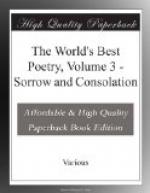HENRY AMES BLOOD.
* * * * *
V. DEATH AND BEREAVEMENT.
LIFE.
We are born; we laugh; we weep;
We love; we droop; we die!
Ah! wherefore do we laugh or weep?
Why do we live or die?
Who knows that secret deep?
Alas not I!
Why doth the violet spring
Unseen by human eye?
Why do the radiant seasons bring
Sweet thoughts that quickly fly?
Why do our fond hearts cling
To things that die?
We toil—through pain and wrong;
We fight—and fly;
We love; we lose; and then, ere long,
Stone-dead we lie,
O life! is all thy song
“Endure and—die?”
BRYAN WALLER PROCTER (Barry Cornwall).
SOLILOQUY ON DEATH.
FROM “HAMLET,” ACT III. SC. I.
HAMLET.—To be, or not to be,—that
is the question
Whether ’t is nobler in the mind to suffer
The slings and arrows of outrageous fortune,
Or to take arms against a sea of troubles,
And, by opposing, end them?—To die, to
sleep;—
No more; and, by a sleep, to say we end
The heart-ache, and the thousand natural shocks
That flesh is heir to,—’t is a consummation
Devoutly to be wished. To die,—to
sleep;—
To sleep! perchance to dream:—ay, there’s
the rub;
For in that sleep of death what dreams may come,
When we have shuffled off this mortal coil,
Must give us pause: there’s the respect
That makes calamity of so long life;
For who would bear the whips and scorns of time,
The oppressor’s wrong, the proud man’s
contumely,
The pains of despised love, the law’s delay,
The insolence of office, and the spurns
That patient merit of the unworthy takes,
When he himself might his quietus make
With a bare bodkin? who would fardels bear,
To grunt and sweat under a weary life,
But that the dread of something after death,—
The undiscovered country, from whose bourn
No traveller returns,—puzzles the will,
And makes us rather bear those ills we have,
Than fly to others that we know not of?
Thus conscience does make cowards of us all;
And thus the native hue of resolution
Is sicklied o’er with the pale cast of thought;
And enterprises of great pith and moment,
With this regard, their currents turn awry,
And lose the name of action.
SHAKESPEARE.
SIC VITA.[7]
Like to the falling of a star,
Or as the flights of eagles are,
Or like the fresh spring’s gaudy hue,
Or silver drops of morning dew,
Or like a wind that chafes the flood,
Or bubbles which on water stood,—
E’en such is man, whose borrowed light
Is straight called in, and paid to-night.
The wind blows out, the bubble dies,
The spring entombed in autumn lies,
The dew dries up, the star is shot,
The flight is past,—and man forgot!




